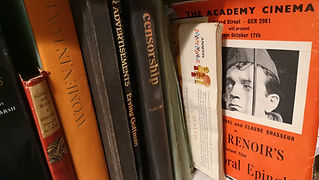News & Updates
23.07.19 UK archival visits and training

With the support of the funding, the Thai PI was able to explore possible future work with various archives. The visit to the UK not only gave the opportunity to work with the CI on the academic paper, attended a conference focusing on film location and visited several film sites but also to visit several archives and gained on-site training on working with archival materials.
Below are a personal reflection on the fantastic experience.
- A simple but absolutely required thing to do before visiting the archive is to book in advance and ask if it is possible to have a tour. This gives an opportunity to get to know the staff, the work of the specific archive, discuss their current projects/interests and specialism.
- Explore in advance and/or during the visit the unique collection that each archive has.
- Sites such as the British Library in London has video materials availble to view on site, prior registraion to get a reader access is required (with proof of address etc.)
Further below are my short recap of the awesome experience with one national, one regional and one university's special collection archives.
- The National Screen and Sound Archive of Wales. The majority of the content in relation to Southeast Asia here are news report from BBC Wales and some documentary programmes. Items found include: stories of the Tsunami diaster in which Welsh tourists were effected, the visit to the sites after the Tsunami by Oxfam (led by a Welsh host), a story of a Thai man learning Welsh by taking an apprenticeship at a bakery in Wales. These materails reflect the archive's aim to store materials related to Welsh culture and people. As a less-known region, Southeast Asia is sometimes mixed with South Asia in the keywords. As regards to national and local activies, the archive does interesting projects including providing a kit to stimulate memories of dementia people through films. The staff is super generous in taking time to show steps to do film restoration and discussing their works. (see more https://www.library.wales/information-for/press-and-media/press-releases/2019-press-releases/launch-of-free-resources-to-stimulate-memories-amongst-older-people-and-those-living-with-dementia/
- The East Anglian Film Archive, which is a regional archive, is a great example of the close collaboration between the university film department and the archive. The staff are super generious in helping check materials related to Southeast Asia in advance and also taking time to explain the development of the online archive system. I was super impressive with the large content shot in Southeast Asia such as videos of soldiers based in Myanmar saying a few words home during war time. I was also fascinated with the colleciton of the Institute of Amateur Cinematographers, particularly home movies shot in Asia in the postcolonial period. Many of these collections are avalialbe to the public, so it is a great resource which I have started using for teaching already! (see more: http://www.eafa.org.uk/) The staff is super kind and the archive has a great link with the Thai Film Archive through their alumni as well.
- The University of Sheffield, Special Collections is great example of how an archive stores materials related to staff research, some of which are collections donated by retired professors. As a lecturer in Cultural Studies I was fascinated by Stuart Hall's perosnal collections including magazines and LPs which where donated to the archive. The archive has interesting collections of photographs related to North Asia (Japan, China) which coincides with the university's school of East Asian Studies' specialism. Similar to the previous two archives, the staff are very kind and generous with their time.
All of these visits make me want to do more work with archival materials in the future!


